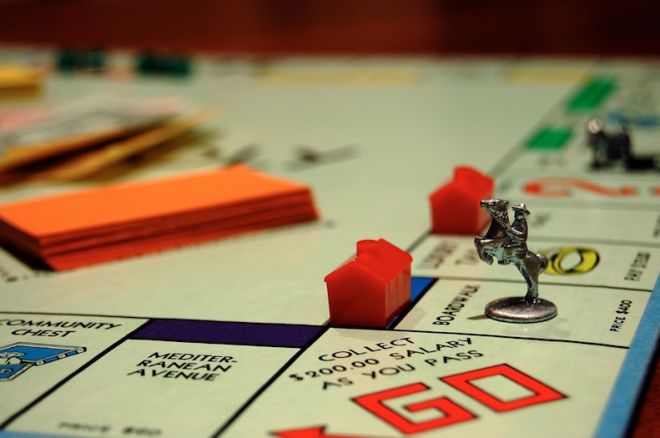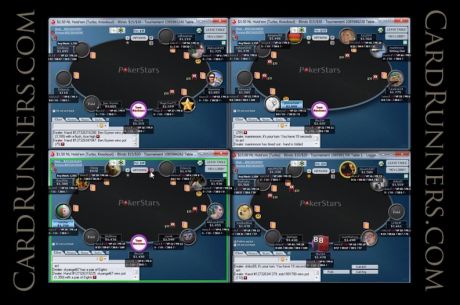Reciprocality in Poker: The One Way to Make More Money Than You Do Now

On vacation with my dad and siblings recently, my brother and I passed the hours playing several games of Monopoly, which I hadn't played in, well, decades. And I had never played it heads-up.
I was struck by how winning in the game required asymmetry. If my brother and I each owned two railroads, we just passed that rent money back and forth. But if I had three and he only one, then not only did I get paid off three times as often, but the rules of the game dictate a higher rent payment each time, and now there would be a net flow of money my way.
The same principle applied to the ��Electric Company�� and ��Water Works�� utilities. If we each had one, it was a wash. But if one of us owned both utilities, there was a strong net flow of cash to the owner.
The whole situation reminded me of one of the simplest but most powerful truths about poker I��ve ever learned �� one which seems obvious once it��s pointed out, but which you probably have not thought of on your own. It��s about reciprocality. My eyes were opened to it through Tommy Angelo��s great book, Elements of Poker, so let me quote him:
Before anything flows, there must be a difference. Between different elevations, water flows. Between different pressures, air flows. Between different poker players, money flows.
��Reciprocality is any difference between you and your opponents that affects your bottom line. Reciprocality says that when you and your opponents would do the same thing in a given situation, no money moves, and when you do something different, it does.
You can mine for reciprocal gold anywhere in the poker universe. Pick a topic, any topic. It can be as general as ��food selection�� or as specific as ��Ace-king in the big blind at limit hold��em.�� You dig for gold by looking for things that you could do differently in the future, things that will create or increase advantageous differences between you and your opponents, and thereby cause theoretical money to flow from them to you.
You��ve probably heard it said that if you��re at a tight table, play looser, and if you��re at a loose table, play tighter. There��s truth in that, and it��s in reciprocality. If you��re making all the same decisions as your opponents, then the money just sloshes back and forth among you, with bits of it being lost to the rake every hand. In order for there to be a net flow of money your direction, you have to do something different �� and something better �� than your opponents.
What might that ��something�� be? Just about anything, really. Here��s a list of possibilities:
- You might steal the blinds better.
- You might pick off bluffs more accurately.
- You might play small suited connectors more optimally.
- You might fold marginal starting hands more often.
- You might be better at exploiting tournament bubbles.
- You might make more correct thin value bets on the river.
- You might be friendlier, and thus pick up extra calls on your strong hands because people don��t mind losing to you.
- You might be better at concealing tells.
- You might be quicker to recognize that this is not a profitable table, and request to be moved.
- You might be sharper at deciding to leave when you��re not playing your best.
If you want to make more money at poker, you��ve got to find something at which you are already superior to your opponents and perfect that skill even further. Or you have to find a leak in your game, something at which your opponents are consistently better than you, that is currently causing money to flow from you to them, and make it stop.
The latter is usually simpler to do, though not easy. It requires a big investment of the kind of humility, introspection, and objective self-evaluation that most players can��t find. It��s simple, in theory, to stop playing like a madman after losing a big pot on a bad beat, but it��s not easy to muster the discipline to recognize that is what you��re doing, that it��s costing you money, and that you need to plug that leak �� and then to do it.
If it were easy, you would have already fixed it long ago, right? In fact, if it were easy to fix, it wouldn��t be such a common problem. But then it wouldn��t present you with a golden opportunity to open up a difference between you and the opponents who tilt in the same way and for the same reasons.
Look for specific things that your opponents are doing better than you. Match what they do, and you stop the flow of money out of your pocket. Learn to do it better than they do, and you make the money flow your way. There is literally no other way to make a long-term increase in the rate of your poker earnings.
Photo: ��Monopoly Cowboy,�� Rich Brooks. Creative Commons Attribution ShareAlike 2.0 Generic.
Robert Woolley lives in Asheville, NC. He spent several years in Las Vegas and chronicled his life in poker on the ��Poker Grump�� blog.
Get all the latest PokerNews updates on your social media outlets. Follow us on Twitter and find us on both Facebook and Google+!








